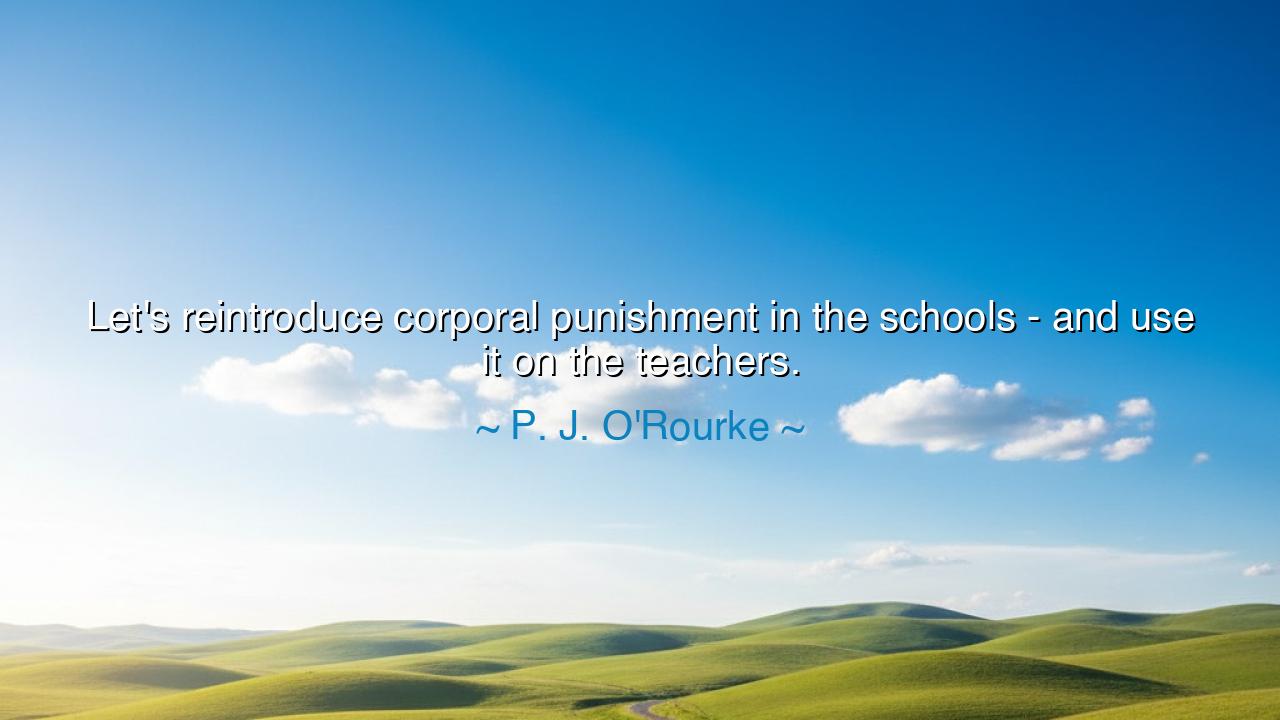
Let's reintroduce corporal punishment in the schools - and use






Hear now the biting words of P. J. O’Rourke, satirist and critic of human folly: “Let’s reintroduce corporal punishment in the schools—and use it on the teachers.” Though these words wear the cloak of jest, beneath them lies a deep and troubling truth. O’Rourke, with the weapon of irony, sought to remind us that much of the failure in education does not rest upon the students alone, but upon those entrusted with the sacred duty of teaching. His words are a whip, not for children, but for the system and those who have misused their charge.
The origin of this saying lies in O’Rourke’s sharp tongue, which often sought to reveal hidden truths through laughter. In ancient times, the satirist was no less important than the philosopher, for both sought to awaken the slumbering minds of men. Where the philosopher spoke in solemn tones, the satirist mocked and stung, driving the lesson home with humor. In this spirit, O’Rourke turned the old debate of corporal punishment upside down: instead of using the rod on the child, he turned it on the teacher, pointing to the failures of adults who too often crush curiosity, smother creativity, and breed apathy in the young.
Consider the story of the great reformer Horace Mann, who looked upon the schools of his age in America and found them barren, harsh, and cruel. Children were struck for errors, yet teachers themselves were often untrained, careless, and indifferent. Mann thundered that the schools must first reform the teachers, for the rod upon children could never produce wisdom, only fear. Thus he labored to create normal schools to train teachers, so that the guardians of learning would themselves be worthy of their task. O’Rourke’s jest is but an echo of Mann’s earnest cry: the faults of the school often lie not in the pupils, but in those who lead them.
History also warns us with darker tales. In many ages, teachers wielded the lash freely, thinking that blows would carve knowledge into the young. Yet such cruelty often bred only resentment. The students who might have blossomed were instead scarred. And when those teachers themselves escaped correction, the cycle of ignorance and brutality continued. Thus, O’Rourke’s words, though draped in humor, carry a serious thrust: perhaps the ones who need discipline are not the children, but the adults who misuse their power.
The meaning, then, is this: the role of the teacher is too sacred to be left unchecked. A poor teacher can wound more deeply than a poor law or a poor soldier, for he shapes minds, and through them the destiny of nations. To jest that teachers deserve the rod is to awaken us to the need for accountability, humility, and constant renewal in education. The humor is sharp, but the truth is sharper still: those who teach must themselves be taught, corrected, and held to the highest standard.
Thus, the lesson for you is clear: do not take lightly the responsibility of guiding another. Whether in the classroom, the workplace, or the home, remember that to instruct is to hold a sacred trust. When you fail in patience, in fairness, in honesty, you deserve rebuke no less than the one who disobeys. True reform begins not with punishing the weakest, but with correcting the strongest. To call for the punishment of teachers is to remind us that those who hold power over the minds of the young must themselves be held to account.
Practical actions flow easily: if you are a teacher, welcome correction; seek feedback from those you guide; be humble enough to admit failure and strong enough to grow from it. If you are a student, a parent, or a citizen, do not let the guardians of learning remain beyond question. Hold them to their charge with firmness and with respect. And in your own life, when you are called to guide others, be ever mindful that leadership requires accountability.
So remember O’Rourke’s jest: “Let’s reintroduce corporal punishment in the schools—and use it on the teachers.” Hear the laughter, but also hear the warning. For humor often hides the sharpest truth: that the reform of the world begins not with striking the powerless, but with correcting those who wield the rod.






AAdministratorAdministrator
Welcome, honored guests. Please leave a comment, we will respond soon